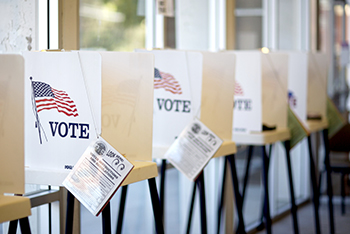 Oct. 1, 2014 – A law that requires Wisconsin voters to show photo identification at the polls will remain in place until the U.S. Supreme Court decides otherwise, according to a recent 5-5 decision by the U.S. Court of Appeals for the Seventh Circuit.
Oct. 1, 2014 – A law that requires Wisconsin voters to show photo identification at the polls will remain in place until the U.S. Supreme Court decides otherwise, according to a recent 5-5 decision by the U.S. Court of Appeals for the Seventh Circuit.
In mid-September, a three-judge panel for the Seventh Circuit Court of Appeals unblocked implementation of the law, 2011 Wisconsin Act 23, which had been blocked through an injunction imposed by federal district court Judge Lynn Adelman in April.
Without deciding the case on the merits, the three-judge panel ruled that the state had a “sufficiently great” chance of showing that Act 23 did not violate voters’ rights.
The plaintiffs who challenged Act 23 asked for reconsideration by the full Seventh Circuit Court of Appeals, known as an en banc review. Last week, the court issued an order denying the reconsideration motion, and said it would not hear the case en banc.
Of the 10 judges voting, five voted to hear the matter en banc. But that wasn’t enough for a majority, so the motion was denied and the injunction that blocked Act 23 remains lifted. The equal split results from a vacancy on the court, which normally carries 11 active judges.
Yesterday, the court issued its reasoning. Like the recent same-sex marriage cases, five judges determined that the voter ID law, enacted through the democratic process, should remain in place until the U.S. Supreme Court issues a final resolution.
The per curiam opinion rejected the claim that leaving the law in place would impose a last-minute change and create chaos for the next election in November, noting that Wisconsin is not required to impose the law if Wisconsin does not want to impose it.
“Wisconsin could decide, for example, that it would be too cumbersome to implement the change with respect to this year’s absentee ballots, but not with respect to live voting in November,” the opinion states. “Our decision does not foreclose such a possibility.”
“Whether to use the photo ID requirement, in the absence of a federal injunction, is a matter of state law, for determination by Wisconsin’s executive and judicial branches.”
The opinion also notes that the photo ID law was enacted in 2011, and suggests that voters had ample time to get photo ID, despite the law’s uncertainty since then. A district court judge estimated that 300,000, or 9 percent of voters, did not have photo ID.
“The number of registered voters without a qualifying photo ID … thus appears to reflect how many persons have not taken the necessary time, rather than a number of persons who have been disenfranchised,” the opinion states.
“We do not apply the label ‘disenfranchised’ to someone who has elected not to register, even though that step also requires an investment of time.”
Dissent
Five judges dissented. Judge Ann Claire Williams wrote a dissenting opinion, joined by Chief Judge Diane Wood and Judges Richard Posner, Ilana Rovner, and David Hamilton. They said the status quo – no voter ID – should remain for now.
“Our court should not have altered the status quo in Wisconsin so soon before its elections,” wrote Judge Williams for the dissent. “And that is true whatever one’s view on the merits of the case. Or stay order was improper, and it should not stand.”
The dissent said the stay “will substantially injure numerous registered voters in Wisconsin, and the public at large, with no appreciable benefit to the state.”
It also noted the factual determination that 300,000 registered voters won’t be eligible to vote, and reprimanded the state for arguing that 90 percent of the electorate still can.
“It simply cannot be the answer to say that 90% of registered voters can still vote,” Judge Williams wrote. “To say that is to accept the disenfranchisement of 10% of a state’s registered voters; for the state to take this position is shocking.”
Unlike the three-judge panel, which relied on a 2008 U.S. Supreme Court case of Crawford v. Marion County Election Board, to determine that Wisconsin’s voter ID law had a sufficiently great chance of surviving on the merits, the dissent disagreed.
“The record that has been made in this litigation is entirely different from that made in Crawford. In every way,” wrote Williams, noting that Crawford was decided on specific facts. “Crawford simply does not direct a victory to the state in this case.”
